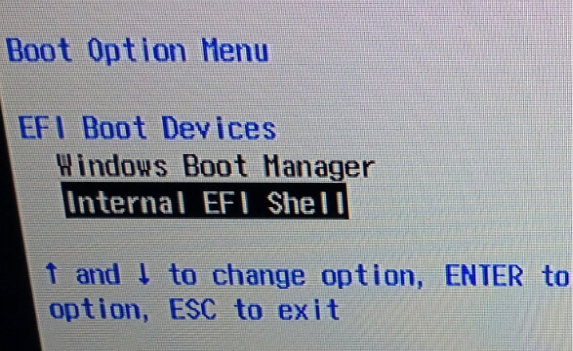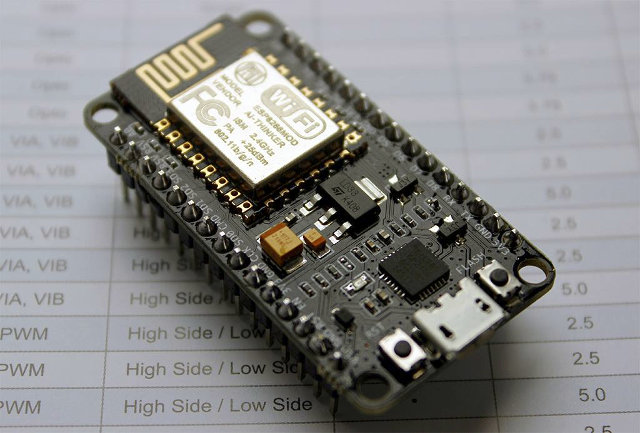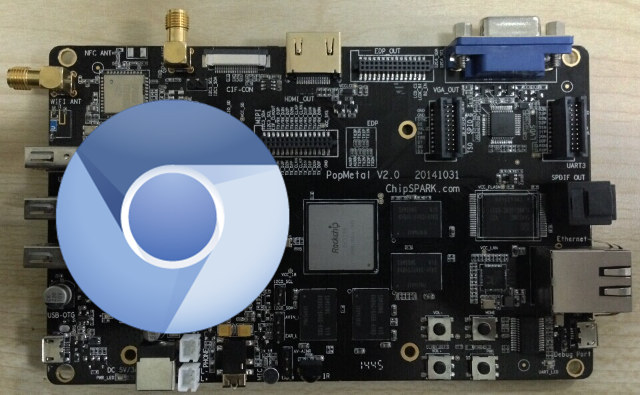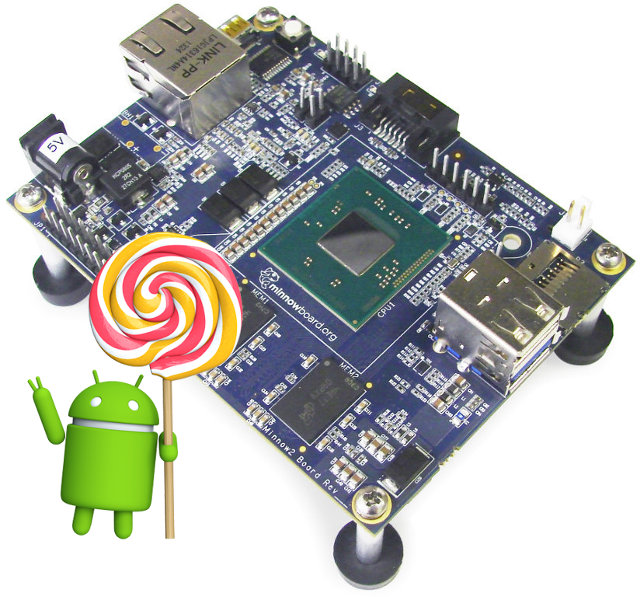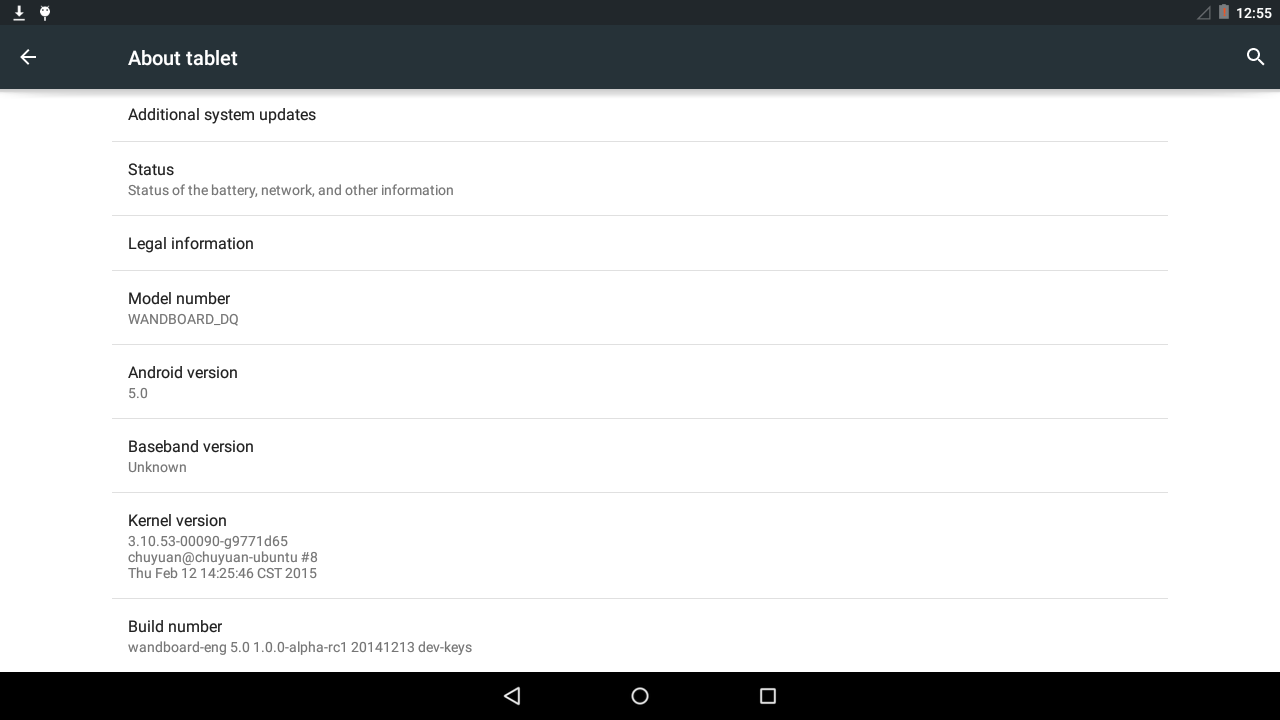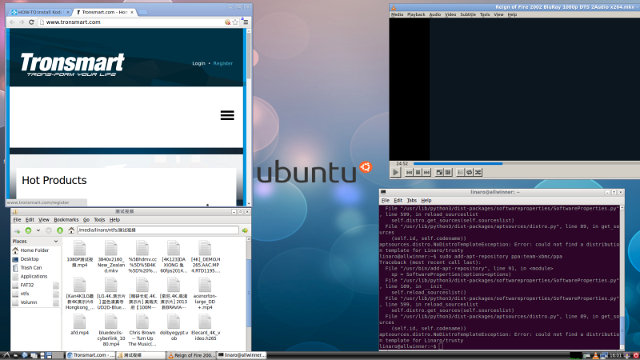Sunchip CX-W8 is an Intel Atom Z3735F TV box running Windows, but I’ve been informed that originally Sunchip designed it for WeTek in order to manufacture a Linux based mini PC. Unfortunately, they finally gave up once they discovered Intel had no intention to work on HDMI audio support in Linux for their Atom Z3700 series processor despite it working on Android… Intel Compute Stick will apparently use a separate DSP to handle that part (TBC). Nevertheless, when WeTek saw I had Wintel W8, they decided to share the 64-bit “BIOS” they had worked on for the Linux port. By the way, Wintel W8 and Sunchip CX-W8 allegedly come from two different factories / design houses, so although they look alike, the hardware might be different, and the UEFI firmware / BIOS, I’m about to share may or may not be compatible with Wintel W8, so you may brick it […]
NodeMCU is both a Breadboard-Friendly ESP8266 Wi-Fi Board and a LUA based Firmware
NodeMCU is a LUA based interactive firmware for Expressif ESP8622 Wi-Fi SoC, as well as an open source hardware board that contrary to the $3 ESP8266 Wi-Fi modules includes a CP2102 TTL to USB chip for programming and debugging, is breadboard-friendly, and can simply be powered via its micro USB port. Let’s checkout the hardware first. The latest version of the board (V1.0) has the following specifications and features: Wi-Fi Module – ESP-12E module similar to ESP-12 module but with 6 extra GPIOs. USB – micro USB port for power, programming and debugging Headers – 2x 2.54mm 15-pin header with access to GPIOs, SPI, UART, ADC, and power pins Misc – Reset and Flash buttons Power – 5V via micro USB port Dimensions – 49 x 24.5 x 13mm The hardware documentation for the board can be found on nodemcu-devkit repo, including schematics and PCB layout designed with Altium Designer, […]
Chromium OS Image for PopMetal Rockchip RK3288 Development Board
We’ve been teased about Chromium OS on Rockchip RK3288 about a year ago, and RK3288 kernel and Chromium overlay have also been available for nearly a year, but AFAIK there hasn’t been any Chromium OS firmware for any particurlar hardware, until yesterday, where Chipspark released a Chromium OS image for their PopMetal board. I haven’t been able to download the file yet, because the download speed is terrible, but you could download chromium_image.tar.gz to have a look. That could mean Rockchip RK3288 based Chrome OS devices may not be so far off now. Jean-Luc Aufranc (CNXSoft)Jean-Luc started CNX Software in 2010 as a part-time endeavor, before quitting his job as a software engineering manager, and starting to write daily news, and reviews full time later in 2011. www.cnx-software.com
Raspbian Image with Docker 1.5.0 Released for Raspberry Pi Boards
I’ve read quite a few articles mentioning Docker recently, but never really looked into it. So what is Docker? The developers describe it as: Docker is an open platform for developers and sysadmins to build, ship, and run distributed applications. Consisting of Docker Engine, a portable, lightweight runtime and packaging tool, and Docker Hub, a cloud service for sharing applications and automating workflows, Docker enables apps to be quickly assembled from components and eliminates the friction between development, QA, and production environments. As a result, IT can ship faster and run the same app, unchanged, on laptops, data center VMs, and any cloud. In practice, it looks like a lightweight virtualization solution that facilitates apps distribution to different operating systems and hardware platforms. For example, if your development machine is running Ubuntu 14.04 and you’ve developed an app requiring Python 3.0, Docker should make it a breeze to it on […]
Android 5.0 Binary and Source Code Release for Minnowboard MAX
Yet another development board gets a Lollipop update with Minnowboard MAX powered by Intel Atom E3815 or E3825 Bay Trail-I processor. Intel’s android-5.0.1_r1-ia0 release uses a 64 bit kernel and a 32 bit userspace, and supports all on-board peripherals such as Ethernet, HDMI (digital Audio + Video), USB host, SATA, I2C+SPI, GPIO, PWM and UART. New features and improvements features for this release include: Digital audio support using HDMI and USB. Linux console on serial port for debugging purposes. Android can be installed on SDCard, USB Stick or SSD. Android Runtime (ART). Material Design UI. Bluetooth 4.0 support using an external USB dongle. SELinux runs in enforcing mode. User data is encrypted by default. Bug fix – GPIO support The image is intended for developers interested in working with Android 5.0 on MinnowBoard MAX, but it does not have all the components to meet Android Compatibility requirements. If you own […]
HPH NT-V6 Firmware V1.4.4 (Rockchip RK3288) Fixes Ethernet Performance, Adds Smartphone App
When I first started to review Rockchip RK3288 based TV boxes I noticed several had critical issues with Ethernet including Nagrace HPH NT-V6 and Kingnovel K-R6. The main cons of the Nagrace media player included: XBMC has too many issues: VC1 not supported, H.265 support only partial, audio/video sync issue, some MPEG-2 and XVID videos are skipping frames, some of the 4K videos I used could play properly, etc… Some MPEG-2 file won’t play smooth in either XBMC or MX Player Potential Ethernet issues, confirmed with my Gigabit switch (D-Link DSG-1005A) and 10/100Mbps D-Link router (configured as a switch). Since then SPMC and Kodi must have improved video playback issues, but as late as last month I still got feedback from one person (Mr. B.) complaining about Ethernet on HPH NT-V6, but he finally got an email with a new firmware that is said to fix the Ethernet issues and […]
Android 5.0 Lollipop Image for Wandboard Development Boards
Wandboard Solo, Dual and Quad are development boards powered by Freescale i.MX6 Solo, Dual, and Quad, that have been launched in 2013. I can remember running Android 4.1.2 and Ubuntu on both Wandboard Dual and Wandboard Quad. Fast forward to 2015, the board is still supported, and Android 5.0 Lollipop beta has been released for the three boards, making these one of the few hardware platforms supporting Android Jelly Bean, KitKat, and Lollipop. You can try it out by downloading the image, and flashing it to a micro SD card (8GB or more) as follows: Linux
|
1 2 3 |
wget http://www.wandboard.org/images/downloads/wandboard-lp-5.0.0-20150213-sdcard-boot.img.xz xz -d wandboard-lp-5.0.0-20150213-sdcard-boot.img.xz sudo dd if=wandboard-lp-5.0.0-20150213-sdcard-boot.img | pv | sudo dd of=/dev/sdX bs=16M |
Where X is the letter for your micro card which can be found with lsblk command Windows – Download wandboard-lp-5.0.0-20150213-sdcard-boot.img.xz, extract it, and flash to the the micro SD with Win32DiskImager. Insert the micro SD into the micro SD slot on the CPU board, and enjoy! At least in theory… If you have […]
Latest Ubuntu 14.10 Image for Tronsmart Draco AW80 Supports Hardware Video Decoding
Tronsmart Draco AW80 is one of the most powerful ARM mini PC on the market thanks to Allwinner A80 octa core processor, and the company also released an early Linux (Ubuntu) image at the end of last year. However, this firmware could not support hardware video decoding nor 2D/3D graphics acceleration. Since then progress has been made, and Tronsmart has just released an image with hardware video decoding. There’s still some work to be done as 4K and H.265 are not supported, and support for Kodi also needs to be implemented. At least for now you should be able to play 1080p video with VLC without issues, and the company also claims online video will play without lags. If you’d like to give it a try, download and extract Draco_AW80_Ubuntu_20150204.zip. Then follow Allwinner A80 firmware upgrade instructions with PhoenixSuit (Windows) or LiveSuit (Linux) firmware tool to complete the process. You […]


